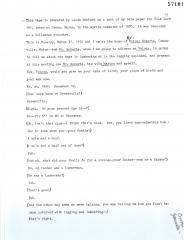

V. Roberts discusses lumbering in the Moosehead Lake area in the early 1900s; how he got involved in lumbering in 1904; driving a six-oxen team; various jobs he had in the early 1900s; lumber camp food; a day’s schedule at a lumber camp in Soldier Town; camp furnishings; entertainment in the form of singing and pranks; getting to the site in Soldier Town and the path the logs took down river; purchasing food in bulk; his grandmother’s traditional medicines; process of moving felled trees; tools used in the woods; eating lunch in the woods; estimating how much timber a lot would produce; bringing supplies into camp in the winter; caulk shoes for river driving; his case of blood poisoning and the long trip to visit a doctor; a log-hauling tractor c. 1920; making roads with a tractor; Cooper Brook trestle; comparative hygiene of Pollacks [Poles] and Frenchmen; and the mechanization of logging with steam haulers and telephones to coordinate. L. Roberts discusses logging on Prong Pond Mountain beginning in 1935; use of par-buckles; setup of the camp; ethnic variety of workers; advantages of not shaving; lumber camp food; driving the tote-wagon; sleeping arrangements in the camp; lice and measures to avoid them; observations on Pollacks’ dealings with lice; responsibilities of a sled-tender; skidded yards versus piled logs; a fatal accident with a skidded yard; use of a snub-warp on steep roads; ram-downs and an accident on one; a day’s schedule; taking care of his horses; blacksmith work; pay; pranks; swinging a yard; icing roads; kinds of sleds – swing-dingles, tote-sleds, and woods pungs; britchen harnesses and belly-lifters for his horses; never touching another man’s equipment; troublemakers visiting camp; his horses falling through the ice; salted codfish; the old logging method as conserving and not wasteful; the new method of logging as wasteful and destructive; and his concern for the future of northern Maine.
|
|
